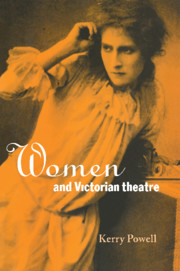7 - Elizabeth Robins, Oscar Wilde, and the “Theatre of the Future”
Published online by Cambridge University Press: 06 November 2009
Summary
We are on the verge of something like a struggle between the sexes for the dominion of the London theatres.
(George Bernard Shaw, 1895)In a decisive moment of the 1890s it appeared that masculine control of the theatre as an institution might be overthrown by the efforts of women and a few male allies. The key figure in this struggle for control of the London stage was Elizabeth Robins, an American actress whose importance has been vastly underestimated. She wanted to make a new career for herself in England – a career which, it turned out, would epitomize the obstacles that Victorian women encountered whenever they performed on stage, wrote plays, or aspired to become “actress-manageresses.”
Frustrated by the limits placed on her own theatrical ambitions, and those of other women in the profession, Robins envisioned a radical “Theatre of the Future” in which biases of gender would be set aside. Freeing women to realize their potential in the profession would raise the level of English drama as a whole and increase its value to society, which itself would be rejuvenated by the standard of equality under which Robins's “Theatre of the Future” would operate. For a time in the early to middle 1890s Robins's ideas of reform, and the complementary work of other late-Victorian women, seemed in a position to challenge seriously the theatrical establishment. But, encountering resistance everywhere, Robins became convinced that she could not manage so ambitious a task alone, or even in combination with other women.
- Type
- Chapter
- Information
- Women and Victorian Theatre , pp. 149 - 173Publisher: Cambridge University PressPrint publication year: 1997



